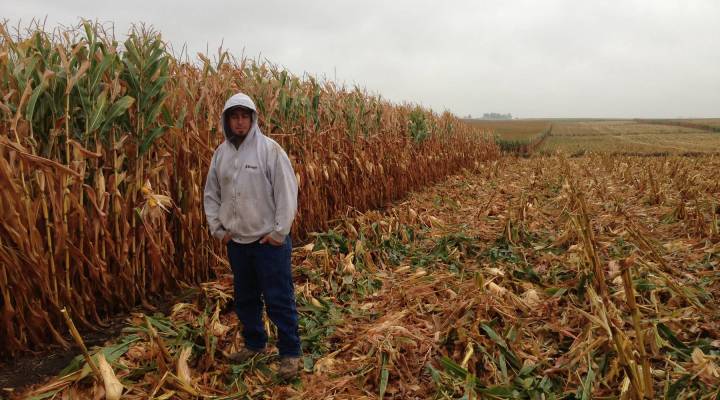
Farming: The next big industry

Ben Albright is standing at the edge of his cornfield in Lytton, Iowa.
Albright jerks an ear of corn off its stalk, pulls down the husk and snaps it in half. “You can see there’s not much of a milk-line left,” he says, “that means the corn is ready to harvest.”
What makes this moment extraordinary is Albright’s age, he’s 35 years old. More than half of farmers in the U.S. are over 55.
Farmers have been aging for decades; the average age of a farmer now is nearly 60. But, the latest census report is expected to show the average age of farmers going down for the first time in more than 30 years. Young people are going into farming because the agriculture economy has experienced a major turnaround.
“I was a child of the 80s, so that was a pretty tough time in the industry,” Albright says. He grew up on his father’s farm in Lytton. Back then, no one wanted to go into farming.
Albright went off to college. “I had a few other jobs, internships, things like that, just to see what else was out there,” he says. “But I just felt like the opportunity in farming was better than anything I could find elsewhere. “
That opportunity is a relatively new phenomenon, according to Mike Duffy, an economist at Iowa State University. “The period we’re in right now is unprecedented in terms of income and land values,” Duffy says. The College of Agriculture at Iowa State has seen record enrollment, and Duffy says more of his students are going back to the family farm after they graduate. As food prices have risen, so have profits for farmers.
“It’s what they hear at home,” Duffy says. “If all they hear is: ‘Woe is me,’ then they don’t want to go into it. If what they see are new combines and trucks, it looks like it might be a good job to get into.”
Still, when Ben Albright came back to Lytton to farm, he thought he’d be one of the few. “I was really surprised at the amount of young people in the community,” he says. “We actually have enough people for a slow-pitch softball team. That was good to see.”
The rising number of young farmers has also gotten the attention of industry assocations.
Luke Gran works with the Practical Farmers of Iowa, which trains novice farmers. “We started with our beginning farmer program in 2008 with about 75 farmers,” Gran says. “The program is now about 1,500 beginning farmers in Iowa.”
Ryan Wilson, 35, is one of them. Wilson runs a 1,200 acre corn and soybean operation in Lenox, Iowa. He wasn’t initially interested in farming, but when he realized he could make a good living, he took the leap. “I used to build cabinets for about 11 years,” Wilson says, “then a neighbor called me and said he was getting too old and too tired to do it anymore, so that’s how I got my first 500 acres.”
Wilson says without that help from his neighbor, he probably couldn’t have gone into farming. That’s the thing about an economic boom: everything gets expensive. Big farms like Wilson’s typically need around $5 million worth of equipment.
“You have to have help. If you’re on your own, trying to get started, you’re going to have to win the lottery,” says Wilson.
Young farmer Ben Albright says his support came from his family. Albright’s property touches his father’s and his brother’s. “Honestly, I probably wouldn’t be farming if I didn’t have opportunity that the four generations before me have built,” says Albright.
Practical Farmer’s Luke Gran maintains there are opportunities for the aspiring farmer without connections. Typically, he says, they start small, with a few acres of vegetables, and work to build something bigger for the next generation.
There’s a lot happening in the world. Through it all, Marketplace is here for you.
You rely on Marketplace to break down the world’s events and tell you how it affects you in a fact-based, approachable way. We rely on your financial support to keep making that possible.
Your donation today powers the independent journalism that you rely on. For just $5/month, you can help sustain Marketplace so we can keep reporting on the things that matter to you.












